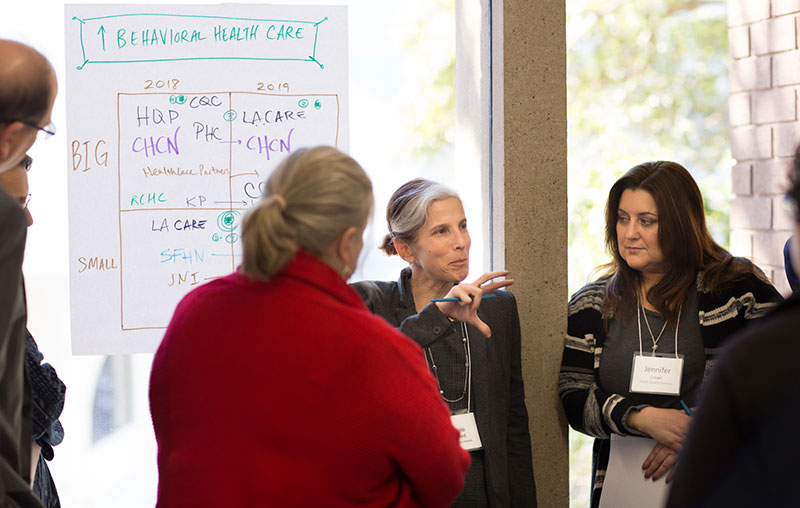As we close up the year, it’s a great opportunity to look back on what we’ve accomplished. The California Improvement Network (CIN), a community that aims to spread better ideas for care delivery, had a busy year establishing connections, learning about quality improvement ideas and innovations, and taking actions to improve care.
Forging Connections Among Health Care Leaders
In February 2018, CIN announced the selection of 17 partners, including provider groups and coalitions, health plans and quality improvement organizations from the commercial sector and safety net. Later that month, these newly minted partners gathered for their first partner meeting of this CIN phase. The power of the network was exemplified by the connections made at this meeting, which explored the topic of provider and staff burnout. Together, the group identified concrete actions to address this topic and shared some of the challenges they anticipated in making progress. A partner from a commercial delivery system shared a story of an early success with peer coaching to increase well-being and resilience. Another partner from the same geographic area asked to follow up to learn more; and a third partner chimed in: “Can I join you?”
Leaders from three organizations, with different missions and populations served, who had never met before, organically came together to collaborate.

Partners convened again in April to discuss social needs that impact health, and again in September to cover primary care and substance use disorder treatment integration. At each meeting, partners asked relevant and insightful questions, eagerly shared progress with the group, and disclosed personal stories. A level of honesty and transparency has developed among the partners which allows them to openly discuss their challenges, successes and failures. The vast majority of partners (Figure 1) reported that they connect with people in different sectors and access unique perspectives at meetings. As one partner noted in a recent survey:
“It's been inspirational hearing [about] the work of other colleagues and health care systems. We don't always know what is possible until we see it in existence elsewhere. It helps us to look upwards and outward, and spread our wings!”
Figure 1
Learning About Cutting Edge Quality Improvement Ideas and Innovations
To accelerate the spread of innovation in care delivery, CIN selected five critical topic areas for 2018 and 2019:
- Making improvements in behavioral health care, with an emphasis on cost management
- Addressing social needs that affect health, with an emphasis on cost management
- Understanding the fundamentals of managing financial risk and the cost of care
- Preventing burnout and promoting provider and staff resilience
- Leading change
Making improvements in behavioral health care, with an emphasis on cost management
While access to behavioral health services has improved substantially over the past two decades, many Californians with mental illness or substance use disorders do not receive treatment. CIN is working to ensure that Californians have timely access to mental health or substance use treatment that is linked to their physical health care.
The fall 2018 edition of CIN Connections, for example, offers actionable information to better integrate primary care and substance use disorder treatment. The network also released two webinars on more effectively engaging patients and providers in substance use disorder treatment.
Social needs that impact health
To improve population health and manage total cost of care, medical providers must support patients, families, and communities in addressing social needs that impact health. CIN Connections, summer 2018 issue: Beyond the Exam Room and the CIN Resource Page: Addressing Social Needs That Impact Health help support health leaders as they take on this issue. In response to partner needs for greater support with calculating and assessing return on investment (ROI) for social needs efforts, CIN also launched a webinar series to help partners and members learn how health care organizations are assessing ROI. This series highlights multiple approaches and lessons learned. Kaiser Permanente and Contra Costa Health Services have shared their initiatives, and Partnership HealthPlan of California will be featured on December 18, 2018.
Preventing Burnout and Promoting Provider and Staff Resilience
Burnout can be defined as emotional exhaustion, interpersonal disengagement, and a low sense of personal accomplishment. A growing body of evidence shows that provider and staff burnout can negatively impact patient outcomes. This issue was addressed at CIN’s spring 2018 partner meeting, and tools and resources to tackle it were included in CIN Connections, spring 2018 issue: Healing the Healers and the associated resource page, Improving Provider Well-Being.
Taking Action
In addition to connecting and learning, CIN supports health care leaders as they implement changes and take action. All partners took at least one action after the February 2018 meeting, and 88% took at least one action after the June 2018 meeting. Below are some examples of actions that partner organizations have taken as a result of the connections they’ve made through CIN or as a result of the topic areas they’ve learned about through CIN resources and meetings. 
The California Quality Collaborative has incorporated social needs evidence and resources into their four-year strategic planning process and are developing a goal around this area. Golden Valley Health Centers have made changes in several of their electronic health record templates to more accurately capture social needs information about their patients. They continue to work with partners on several fronts: they’re addressing homelessness through a countywide initiative to develop a low-barrier shelter with co-located social service, they’ve expanded their street nursing program, and they’ve partnered with several food agencies to do outreach during health center events. Community Clinic Association of Los Angeles (CCALAC) will hire a health equity manager to help the organization coordinate efforts internally as well as assess patients’ social needs. To address provider and staff burnout, CCALAC has developed a workforce wellness pilot protocol at three clinics that will leverage coaches. Humboldt IPA is incorporating a validated social determinants of health assessment tool into a school-based health center as a result of a connection that was made at CIN’s partner meeting. To address provider burnout they have formed a “joy in work” team and implemented a staff satisfaction survey. HealthCare Partners Medical Group has started a behavioral health integration model that incorporates telehealth to decrease travel for patients to get to providers.
Looking Forward
In 2019, CIN will continue to identify and spread better ideas for care delivery through partner meetings, and a wide range of resources, tools, and technical assistance to address its phase 6 priority topic areas. Early in the new year, CIN will release a toolkit for health care delivery organizations to diagnose barriers, apply change strategies, and utilize existing resources to improve substance use disorder treatment in primary care. In March, the network will gather for its next partner meeting on managing risk and total cost of care and will also debut case studies of organizations that have successfully implemented screening or referral tools for their social needs efforts. At their June meeting, partners will address the priority topic of leading change. As the only network in California that brings together commercial and safety-net provider organizations, health plans, and quality improvement groups, CIN will continue to foster valuable cross-sector relationships across the state. We wish everyone a healthy and happy new year filled with growth and progress.
Join CIN
Join CIN to get the latest quality improvement resources, tips, and tools delivered straight to your inbox. CIN is a project of the California Health Care Foundation and is managed by Healthforce Center at UCSF.

